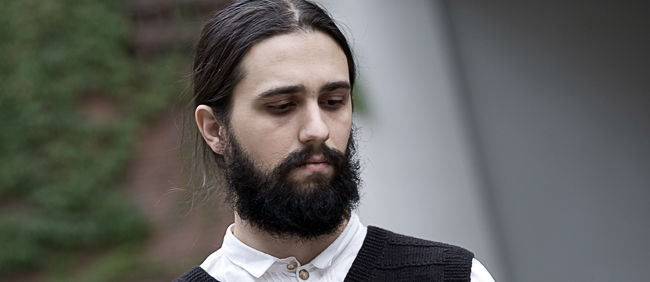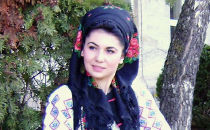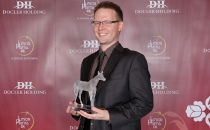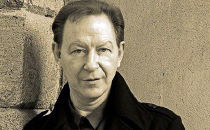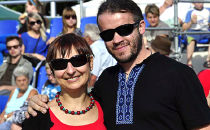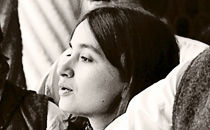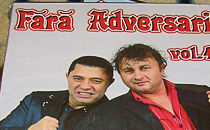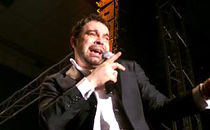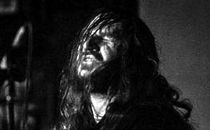How did your band come into the existence?
In short, the story of our band is connected with the family reunion. In 2003-2004 I had played in the band with my wife, Beatrice Iordan and my brother in law - Dinu Petrescu. After that, in 2005, Daniel Pop joined the group. At the very beginning it was a kind of playing for pleasure, friends, and ourselves. We were usually performing all kinds of Romanian traditional music that we liked. My wife sang and played kobza (string instrument), I played flutes, kaval and cobza as well. My brother in law, Dinu, was always responsible for percussion while Daniel for kobza, flutes, kaval, Jew's harp and male vocal. Then, we became increasingly interested in making a more unified project. This corresponded with our growing attraction for old urban music in Romania. In this way our "Bazaar" was born, an attempt to reconstruct traditional music that was beeing played 100-200 years ago in cities, fairs, inns and pubs in Moldova and Walachia - the region in the eastern-south of Romania.
Did you record it as an album?
Yes, we did. The first was published in 2008 by a small independent label owned by a jazz club. Disc was finally sold out in 2011 and haven't been reprinted. We didn't want to have it released once more because then we were not satisfied with this material. The second, "Bazaar II", was published in 2012 by another small label specializing in traditional music from Romania, called Ethnophonie. Label is practically connected with the Museum of the Romanian Peasant, where I work.
What is your private musical inspiration?
Each of us has had throughout his life various musical preferences. Each of us has listened to a lot of rock music. Now our preferences are turning to various forms of jazz, world-music, traditional and early music. We are of course very attached to Balkan music, the music of Central Europe or from the Middle East. Daniel is more interested in Balkan and klezmer one, Beatrice in early music, Dinu in jazz records such as those published by the ECM record label. I am closer to the old recordings with "raw", traditional music.
What about arrangement of your songs?
Bazaar project, as I mentioned before, tries to reproduce the music as possible almost in the style of the era. We try to be a classical revivalist group that is studying era resources, adding music auditions of early recordings from urban Romania - I mean the ones from the beginning of the twentieth century. We even have made several field research expeditions in various villages. Naturally, it is not easy to succeed in such approach: information about this music are scattered and incomplete. Then, contemporary audience and contexts of interpretation are different from those of 150 years ago and "put pressure" on musicians: sometimes, because of the desire to be closer to the public, we can at times treat music in not so strict way. So somehow our concerts depend from the different contexts of interpretation.
What is the balance between tradition and innovation in your music? Are the Trei Parale’s lyrics only traditional?
So far, all of our songs have been traditional. Both in terms of text and song. We have not been proposed yet to compose songs. But we want to achieve other project, different from the Bazaar, where we'll feel free to treat music as we have inspiration.
So please tell us about other projects that you are invovlved in.
Three years ago we were invited by a rock project called Balkanic Zeppelin to work on the Balkanic stuff. It consists of 12 Zeppelin’s songs played with bass, guitar, drums and voice. And also with our flutes, cobza and the cimbal of a famous cimbal player in Romania. This project was presented in Romania, but also in Budapest, between 2009 and 2011. Then it was realesed on a promotional CD. Last year, we had another collaboration in a world-music project. We played with two great Israeli musicians: the oudist Yair Dalal and the percusionist Erez Monk. We had one concert in Bucharest and one in Tel-Aviv. It was great and we hope to do it again when the opportunity arises. This collaboration also "opened" our appetite for a project that will focus on songs and improvisations from Balkans and Middle East. We are working now on it and hope to have the premiere in autumn.
Until then we'll have another premiere. At the end of May we'll present to the public of Bucharest a new program, called "Shepherd who has lost his sheeps". It will focus on pastoral world, there will be some ballads. We will play various Romanian flutes: flute, pipe, tilinca and bagpipes.
What should I say more? In all this projects we will remain acoustic. We know that nowadays people prefer electric music, to hear a mix of acoustic instruments with electric guitars and drums. Well, we won't do that... Although it is difficult for a group to maintain its way - to have a clear vision and follow it. Television, radio and all the commercial things are exerting a lot of pressure but I think it is important to keep your own way.
Who is your music adressed to?
Our audience is generally varied. There's a young audience who prefer traditional music like we play. Here, I must make a brief digression. Unfortunately, in Romania during communism there was a way to arrange traditional music for political purposes. Namely, huge folk music ensembles came into exsitence and were encouraged to play distorted and falsified folklore. That is why young people still do not feel any attraction to this kind of music. Instead they prefer what we do. For elderly people our music is an interesting discovery: familiar, yet different, something new, yet very old.
Outside Romania, recently we have became more and more known - I mean strictly on the Eastern Europe traditional music scene. Since 2010 we have performed in Budapest and Miskolc (Hungary), Istanbul, Tel Aviv and Ierusalim, Dusseldorf. In Autumn we'll come back to Germany.
What about your Romanian gigs, what kind of concerts do you have?
I think that we have a nice public in Romania - people do come to our concerts. We play mainly at the festivals: medieval and early music festivals, jazz and world-music festivals, open-air festivals and even classical music festivals. Apart from that we perform in clubs, mostly in Bucharest. We sometimes also play in traditional contexts like weddings, baptism and other private parties, just as once played the folk musicians. This is always an exceptional experience.
Tell us more about your non-musical activities, about your every-day life...
Each of us is involved in different activities. Daniel is a teacher in a typical Waldorf school. Beatrice is a professional actor puppeteer. Daniel, Beatrice and I are involved in a theater company HopaTrop for small children, aged 2 to 6 years. Dinu is a mosaicist, paints churches and icons. As I said before, I work at the Museum of the Romanian Peasant and I am involved in researching traditional music in Romania. With my two colleagues, Speranta Radulescu and Costin Moisil, we published a series of discs called Ethnophonie and organize concerts, events, etc... So far the series has had 22 discs and we have been working at another two. Incidentally, Mrs. Speranta Radulescu from the Museum is the one who discovered two groups that are successfully known all over the world: Fanfare Ciocarlia and Taraf de Haidouks.
Was the concert at Mikołajki Folkowe Festival in 2010 your first visit in Poland?
Yes, it was our first Polish concert, and till now the only one. It was a special concert called "Folk by night", held at one o’clock in the morning. But people gave us a vey warm welcome. We do hope to come back someday to Poland.
Do you know something about Polish folklore?
Very little. Before our coming to Poland I was searching in the Internet and listened to St. Nicolaus Orchestra’s concert. I liked it very much. But about old music not so much... I also once saw in Romania Polish Joszko Broda Band and liked them very much. Thier music had some links with the Transilvanian folklore. I have also listened to Kroke album recorded with Nigel Kennedy - so we know something about the instruments and the sounds.
We are living in Internet era, where we can find you in the web?
It is very easy to find us in the Internet, we have our website: www.treiparale.ro and a facebook profile. Some of our songs can be found on Trei Parele youtube channel.
What does it mean: "Trei Parale"?
Three Pennies... Like Bertold Brecht’s "The Three Penny Opera". This name is apropriate for the music which is abandoned, thrown out, that is worth nothing more than three pennies. The music, which is worthless today we want to put in the front.
At the end of the interview I would like to ask you about a very controversial part of Romanian music - manele. What is your opinion - is this contemporary urban folk or not?
The situation of manele is interesting, this music is between two worlds. Sometimes it functions as a traditional music at the weddings, baptism, played by professional musicians to fullfill people’s needs. In other way it functions as poprock scene – with videos, CDs, shows... In some way it is Balcanic and Occidental, it is disco with traditional music, it represents the world somewhere between East and West. Old and New. The music is contoversial because of many reasons. Sometimes is it played for Romanian mafia, the people react not against the music itself, but against the world that is presented. This music presents something that some Romanians do not like. The situation is very complicated, is not easy to judge why the people like or do not like it... Maybe in the same way situation with manele is similar to hip-hop, it is also a kind of suburban musical culture.
Thank you for the meeting and interview!
